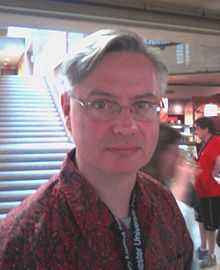Ned Balbo
| Ned Balbo | |
|---|---|
 Ned Balbo attending the West Chester University Poetry Conference | |
| Born | November 19, 1959 |
| Occupation | poet, essayist, and professor |
| Nationality | American |
| Alma mater |
Brentwood High School '77 |
| Genres | poetry, essay |
| Notable award(s) |
Willis Barnstone Translation Prize co-winner, 2013 Poets' Prize, 2012 Donald Justice Poetry Prize, 2010 ForeWord magazine Book of the Year Gold Medal, 2005 Ernest Sandeen Prize in Poetry, 2005 Robert Frost Foundation Poetry Award, 2003 John Guyon Prize in Literary Nonfiction, 2002 Towson University Prize for Literature[1]co-winner, 1998 |
| Spouse(s) | Jane Satterfield |
Ned Balbo (born November 19, 1959, Mineola, New York)[2] is an American poet, translator, and essayist.
Life
Ned Balbo grew up on Long Island, New York.[3] He was raised by Betty and Carmine Balbo, his birth mother's half-sister and her husband, who he believed were his parents.[4] At thirteen Balbo learned he was adopted.[5] This background informs his creative work.[6]
Balbo graduated from Brentwood High School in 1977.[7] He earned his Bachelor of Arts at Vassar College in 1981, his Master of Arts at Johns Hopkins University in 1986, and his Master of Fine Arts at the University of Iowa in 1989.[3][8]
Since 1990, he has taught poetry and prose at Loyola University Maryland. He currently lives in Baltimore, Maryland with his wife, poet-essayist Jane Satterfield, and her daughter Catherine.[3]
Poetry and style
According to Lisa Vihos in Verse Wisconsin, "Balbo...gives shape and heft to the formless, fleeting past--both historical and personal--through his rich language."[9] In reviewing The Trials of Edgar Poe and Other Poems for JMWW, Patricia Valdata observes that Balbo's work "raises difficult questions about home, about the relationship of parent to child, about a society's responsibility to its poor."[10] Writing in Studio, Lucas Jacob notes that in The Trials of Edgar Poe and Other Poems, "Balbo...reminds us of the grace we find in our time with each other on this 'island' of life on Earth."[11]
Balbo has written in a variety of forms, including blank verse, sonnets, villanelles, sestinas, and nonce forms, as well as free verse.[3]His poetic influences include Ai, Elizabeth Bishop, Louise Bogan, Robert Frost, Randall Jarrell, Denis Johnson, Weldon Kees, and others.[12]
Awards
In addition to book awards, Balbo has received three Maryland Arts Council Individual Artist Awards in poetry and the Robert Frost Foundation Poetry Award.[3]
He received the John Guyon Literary Nonfiction Prize for the essay "Walt Whitman's Finches: on discretion and disclosure in autobiography and adoption," published in the literary journal Crab Orchard Review in 2002.[13] "My Father's Music," an essay on adoption, ethnicity, and popular culture, and a finalist for the Pirate's Alley William Faulkner Society's Gold Medal in the Essay,[14] appears in Our Roots Are Deep with Passion: Creative Nonfiction Collects New Essays by Italian American Writers (Other Press, 2006).[15]An Italian version of this essay (Carla Antonucci, translator) appeared as “La Musica di mio padre” in Padri: Tre memoir italo americani, edited by Anna Maria Crispino (Iacobelli: Rome, 2009).[16]
Balbo has also been a Walter E. Dakin fellow at the Sewanee Writers Conference and several times a fellow in poetry at the Virginia Center for the Creative Arts.[17]
Bibliography
Books
- 2010 — The Trials of Edgar Poe and Other Poems (Story Line Press; winner of Donald Justice Poetry Prize[3]and 2012 Poets' Prize)[18]
- 2005 — Lives of the Sleepers (University of Notre Dame Press; winner of Ernest Sandeen Prize and ForeWord Magazine Book of the Year Award, Gold Medal in Poetry)[3][19]
- 1998 — Galileo’s Banquet (Washington Writers' Publishing House; shared Towson University Prize for Literature with God's Long Summer[20]by Charles Marsh)[3]
Chapbook
- 2009 — Something Must Happen (Finishing Line Press)[3]
Essays
- 2006 — “My Father’s Music.” Our Roots Are Deep with Passion: Creative Nonfiction collects new essays by Italian-American writers. Eds. Lee Gutkind and Joanna Clapps Herman. New York: Other Press, 2006: 87-103.[21]
- 2003 — “Paul Is Dead, and We’re All Listening: Rumor and Revelation, 1969.” Spec. nonfiction issue of JMWW (2011).[22] [Originally appeared in Die Cast Garden 2 (2003).]
- 2002 — “Walt Whitman’s Finches: of discretion and disclosure in autobiography and adoption.” Crab Orchard Review 8.1 (2002): 180-95.[23]
References
- ↑ "Montgomery College to Host Four Readings by Award-Winning Authors: “Books and Ideas” Series Features Pietrzyk, Morris and Poets Satterfield, Balbo." Montgomery College. August 19, 2005
- ↑ "MARC Display." Library of Congress Authorities. The Library of Congress.
- ↑ 3.0 3.1 3.2 3.3 3.4 3.5 3.6 3.7 3.8 Lori A. May "An interview with Ned Balbo." Poets' Quarterly Issue 3. April 2010.
- ↑
- ↑
- ↑
- ↑ Ned Balbo's Facebook
- ↑ Graduate Programs. Loyola College in Maryland
- ↑
- ↑
- ↑ http://studiojournal.ca/vol-5-1-2011/reviews/jacob/index.html
- ↑ http://www.facebook.com/pages/Ned-Balbo/265838986763467?sk=info
- ↑
- ↑
- ↑
- ↑ http://www.bottegascriptamanent.it/?modulo=Articolo&id=831
- ↑ "Ned Balbo's Biography." Ned Balbo: Poet and Essayist. Red Room. Accessed: Sept. 26, 2010
- ↑ http://www.facebook.com/pages/Ned-Balbo/265838986763467
- ↑ http://undpress.nd.edu/book/P01015
- ↑ http://press.princeton.edu/titles/8651.html
- ↑
- ↑ http://jmww.150m.com/Balbo.html
- ↑
External links
- "Interview" with Ned Balbo, conducted by Sørina Higgins.
- "Fire Victim" by Ned Balbo - American Life in Poetry, selected by Ted Kooser, U.S. Poet Laureate.
- "Four Poems" by Ned Balbo - Studio Journal.
- "Desire: A Bestiary" by Ned Balbo - Verse Daily.
- "Chesterfield" by Ned Balbo - The Writer's Almanac, selected by Garrison Keillor.
- "Lives of the Sleepers" by Ned Balbo - Image Update book review.
- "Aristaeus Forgiven" by Ned Balbo - Frost Notes, Robert Frost Foundation.
|